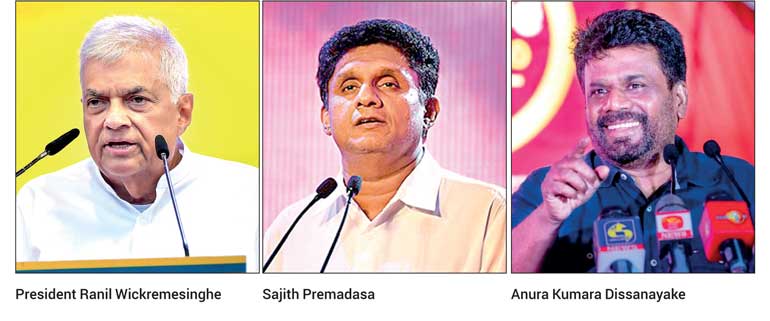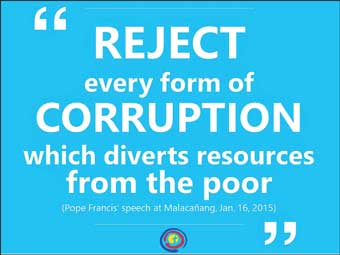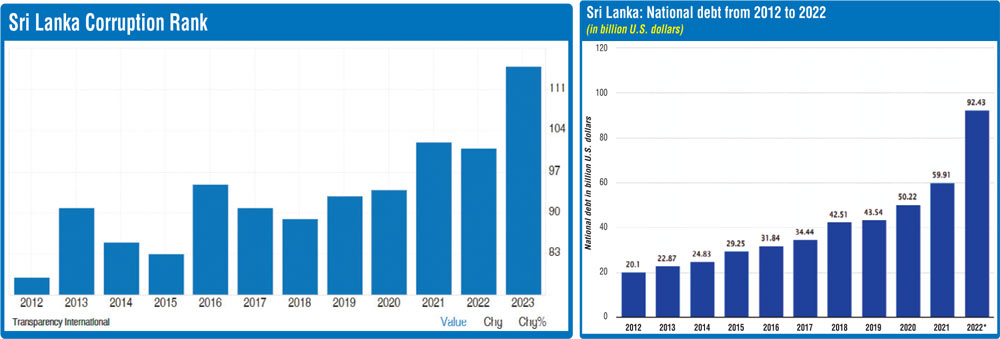Sunday Feb 15, 2026
Sunday Feb 15, 2026
Thursday, 19 September 2024 00:22 - - {{hitsCtrl.values.hits}}

 The choice of the most suitable Presidential candidate for Sri Lanka depends on several key factors, including the candidate’s vision for economic recovery, governance, accountability, and social welfare, among other areas. Here are a few qualities and areas of focus that could guide the evaluation of a suitable candidate:
The choice of the most suitable Presidential candidate for Sri Lanka depends on several key factors, including the candidate’s vision for economic recovery, governance, accountability, and social welfare, among other areas. Here are a few qualities and areas of focus that could guide the evaluation of a suitable candidate:
Economic expertise: Given Sri Lanka’s ongoing economic challenges, including debt restructuring and inflation, a candidate with strong economic management skills is essential. They should have a track record in promoting sustainable development, attracting investment, and creating jobs.
Reform-oriented mindset: The candidate should prioritise structural reforms in governance, the judiciary, and public institutions. Addressing corruption and implementing transparency measures are key to restoring public confidence.
Unity and reconciliation: A leader who can foster ethnic harmony, national unity, and inclusivity would be crucial for Sri Lanka’s long-term stability. They should focus on healing past divisions and promoting equal rights.
International relations: Given Sri Lanka’s strategic location, a balanced foreign policy is vital. The candidate should manage relationships with key players like India, China, USA, Japan and Western countries, particularly in areas like trade and security.
Environmental sustainability: With climate change being a critical issue, a leader who prioritises environmental policies, renewable energy, and sustainable development could steer the country toward a greener future.
Social welfare and education: Candidates who focus on improving healthcare, education, and addressing poverty will appeal to the broader electorate, ensuring long-term social well-being.
In the current landscape, candidates who can align with these areas while demonstrating ethical leadership and a clear, actionable vision for Sri Lanka would likely be considered the most suitable.
Main candidates and their policies
To evaluate the suitability of Sri Lanka’s potential Presidential candidates, we can consider the most prominent figures and their policies based on the current political landscape. Here’s a brief look at key individuals who could emerge as strong contenders:
1. Ranil Wickremesinghe
Current role: President of Sri Lanka (since July 2022)
Strengths: Ranil Wickremesinghe has extensive experience in politics, having served as Prime Minister several times. He is seen as a technocrat with a focus on economic reforms. His Government has played a role in securing IMF agreements and debt restructuring plans, which are crucial for economic recovery.
Challenges: Wickremesinghe’s handling of the economic crisis has been both praised and criticised. Many view him as out of touch with ordinary people, and his policies might not resonate with the broader electorate, particularly in terms of addressing social inequality and corruption. Under his leadership the general public does not see the transparency and good governance. There is no control of bribery and corruption the general public see under his leadership.
2. Sajith Premadasa
Current role: Leader of the Opposition, Leader of Samagi Jana Balawegaya (SJB)
Strengths: Premadasa is known for his populist policies focused on poverty alleviation, housing projects, and welfare programs. His vision includes a more people-centric approach to governance, with an emphasis on social services and grassroots support.
Challenges: While popular among certain segments of the population, Premadasa’s policies may not appeal to business elites or international investors. His leadership ability has also been questioned, especially during times of crisis. He is also offering so many things free of charge in order to improve his vote base but the general public has to think this kind of colossal expenditure finally will come behind them in the form of taxes and higher cost of living.
3. Anura Kumara Dissanayake
 Current role: Leader of the Janatha Vimukthi Peramuna (JVP)/National People’s Power (NPP), or Jathika Jana Balawegaya (JJB)
Current role: Leader of the Janatha Vimukthi Peramuna (JVP)/National People’s Power (NPP), or Jathika Jana Balawegaya (JJB)
Strengths: Anura Kumara Dissanayake is seen as a reformist and a staunch advocate against corruption and nepotism. He represents the left-wing ideology, focusing on workers’ rights, anti-capitalism, and reducing inequality. His calls for institutional reforms resonate well with the youth and those frustrated with mainstream politics. The people of this country are looking for a leader who can stop corruption and improve the governance. He stands the highest among the others in this area.
Challenges: His anti-elite stance and leftist policies might not sit well with the business community and international investors. While he has gained traction, the JVP has historically struggled to translate its support into electoral victories. Independent and common people are not yet sure about what he will do if he comes to power with regard to their inherited wealth and their genuine savings made over the years. I see this as a major challenge for him if he does not clear this doubt.
Biggest issues with regard to governance in Sri Lanka
Governance in Sri Lanka has long been a subject of debate, with multiple structural, political, and economic challenges. These issues have often contributed to instability, economic downturns, and social unrest. In this article, I examine some of the most pressing governance issues the country currently faces.
1.Corruption and lack of accountability
Corruption remains one of the most significant impediments to effective governance in Sri Lanka. From high-ranking officials to local government bodies, allegations of mismanagement and graft are rampant. The lack of transparency in public administration, combined with weak legal frameworks to address corruption, has undermined the public’s trust in institutions. Corruption scandals, often involving state contracts, tenders, and misappropriation of public funds, highlight a culture of impunity that pervades all levels of Government. The key consequences due to corruption and lack of accountability are; we have to face misallocation of resources, leading to inefficient public services; decreased foreign investment due to perceptions of risk and instability; erosion of public trust in democratic institutions and the rule of law.
2. Economic mismanagement
Sri Lanka’s economic crises, including the severe downturn in 2022, are often attributed to poor governance decisions, particularly regarding debt management and public finance. Missteps like unsustainable borrowing, populist policies that prioritise short-term political gains over long-term stability, and poor fiscal oversight have crippled the country’s economy. The governance failures in handling the economy were exacerbated during the COVID-19 pandemic, where the Government’s response to the crisis led to an even deeper fiscal hole. The key consequences due to economic mismanagement are high inflation, currency depreciation, and rising cost of living; increased debt burden leading to austerity measures that hurt the most vulnerable; a loss of credibility with international financial institutions and downgrade of our country ratings.
3. Ethnic and political polarisation
Sri Lanka’s history of ethnic tensions, particularly between the Sinhalese majority and Tamil minority, continues to influence governance. Rather than promoting inclusivity and reconciliation, successive Governments have often exacerbated ethnic divisions for political gain. The politicisation of ethnicity creates policy paralysis, prevents genuine reconciliation efforts, and fosters long-term societal rifts. This is further complicated by the influence of religious and nationalist movements, which can undermine the secular governance structure. The key consequences due to ethnic and political polarisation are prolonged post-war reconciliation process; weakening of national unity and increased marginalisation of minority groups; hindrance to policy-making due to identity-based political conflicts.
4. Weak institutional frameworks
One of the most critical issues in governance is the lack of robust, independent institutions that can act as checks and balances against executive power. Sri Lanka’s judiciary, while nominally independent, has often been subject to political interference. The politicisation of key institutions like the Central Bank, police force, and anti-corruption agencies has eroded their ability to function impartially. This weak institutional framework enables the concentration of power in the hands of a few, limiting accountability and reducing the effectiveness of governance. The key consequences due to weak institutional frameworks are concentration of executive power, undermining democracy; ineffectiveness of law enforcement in tackling crime and corruption; institutional paralysis, leading to inefficiency and poor governance outcomes.
5. Political patronage and nepotism
The political culture in Sri Lanka is rife with patronage networks, where political loyalty is rewarded with jobs, contracts, tenders and political favours. Nepotism has often been a central feature of governance, with powerful families and political dynasties dominating the political landscape. This system marginalises those outside these networks and stifles meritocracy. It also perpetuates inefficiencies within the Government and public sector. The key consequences due to political patronage and nepotism are entrenchment of political elites and marginalisation of capable professionals; poor service delivery due to unqualified appointments in key Government positions; limited upward mobility for those outside patronage networks.
6. Over-centralisation of power
Sri Lanka’s governance system is highly centralised, with much of the decision-making authority concentrated in the executive branch. While the 13th Amendment to the Constitution attempted to decentralise power through the establishment of provincial councils, their effectiveness has been limited. The central government continues to dominate critical areas such as finance, education, and healthcare. This over-centralisation has reduced the capacity of local governments to respond to the unique needs of their regions, resulting in governance failures at the grassroots level. The key consequences due to over-centralisation of power are, inability of provincial and local governments to address regional needs effectively; concentration of resources in Colombo, leading to regional inequalities; and bottlenecks in decision-making, resulting in delayed or ineffective policies.
7. Environmental governance
In recent years, Sri Lanka has faced increasing environmental challenges, including deforestation, water pollution, and unsustainable urban development. Weak environmental governance is partly to blame, with Government policies failing to strike a balance between development and environmental sustainability. Furthermore, poor enforcement of existing environmental laws and rampant illegal activities, such as sand mining and illegal logging, has worsened the situation. The key consequences due to environmental governance are, degradation of natural resources, threatening biodiversity; increased vulnerability to climate change impacts like flooding and droughts; negative impact on tourism and agriculture, two critical sectors for the economy.
8. Public distrust and political apathy
A significant issue in Sri Lanka’s governance is the growing public distrust in political leaders and the political system as a whole. Years of unfulfilled promises, systemic corruption, and economic mismanagement have led to widespread disappointment. Voter apathy is on the rise, especially among the youth, as they see little hope for meaningful change within the current political framework. This erosion of faith in governance structures is dangerous for democracy, as it can lead to increased instability and public unrest, as witnessed during the 2022 mass protests. The key consequences due to public distrust and political apathy are, reduced civic engagement, weakening democratic accountability; greater potential for unrest and political instability; difficulties in passing critical reforms due to lack of public support.
Sri Lanka’s governance challenges are complex and multifaceted, ranging from systemic corruption and economic mismanagement to ethnic polarisation and environmental degradation. Addressing these issues will require not only political will but also deep structural reforms to create a more accountable, inclusive, and efficient system of governance. Without tackling these underlying problems, Sri Lanka may continue to face crises that hinder its progress and development. In this article I want to highlight the need for reform and a renewed commitment to transparent, equitable governance that serves the interests of all Sri Lankans.
Large-scale corruption in Sri Lanka
Sri Lanka has witnessed several high-profile corruption scandals that have severely impacted its economy and governance:
Central Bank bond scam (2015): This involved the manipulation of treasury bonds, leading to losses of Rs. 10 billion ($ 65 million) for the Government due to insider dealings.
Mihin Lanka scandal: The State-owned airline accumulated losses of Rs. 17.2 billion ($ 109 million) before being merged with SriLankan Airlines, reflecting poor financial oversight.
Greek bonds investment loss (2012): The Employees’ Provident Fund lost Rs. 2.4 billion ($ 15 million) by investing in risky Greek bonds, raising concerns about the mismanagement of workers’ retirement funds.
Mattala Rajapaksa International Airport: Known as the “world’s emptiest airport,” it cost Rs. 27 billion ($ 210 million) but saw little use, contributing to Rs. 16 billion ($ 104 million) in losses.
Avant Garde Maritime scandal (2015): A private security firm illegally profited Rs. 13 billion ($ 83 million) through questionable defence operations involving high-ranking officials.
SriLankan Airlines scandal: Corruption in aircraft procurement deals contributed to over Rs. 232 billion ($ 1.4 billion) in accumulated losses.
Lotus Tower project: Delays, cost escalations, and a vanished contractor led to allegations of financial mismanagement in this $ 104 million project, with $ 13 million lost in an advance payment.
The sugar import tax scandal (2020-2021): resulted in a significant loss of Government revenue and disproportionate benefits to a single importer. The Government reduced the sugar import tax from Rs. 50 per kilogram to Rs. 0.25 per kilogram, leading to a Rs. 16 billion (approximately $ 80 million) loss in potential tax revenue.
The solar power award scandal: Ceylon Electricity Board (CEB) awarding a solar power contract to an Indian company at a rate of 7.55 US cents per kWh, despite a local company offering a lower bid of 5.75 US cents per kWh. This decision led to allegations of favouritism and potential political influence, as the Indian company’s bid was significantly higher, increasing costs for Sri Lanka. The controversy raised concerns about transparency, governance, and the potential impact on electricity tariffs, while also sparking criticism over the lack of support for local businesses.
The wind power project scandal: Involved awarding a major wind power contract to an Indian company at a higher rate compared to other bidders. The offered price by this company was $ 8.26 per unit and local companies were offered as 4.88 this means a $ 3.38 per unit. This will create a loss of Rs. 400 million or $ 1.35 billion over 20 years.
The most recent one is the visa scam: This was offered to VF Worldwide Holdings Ltd., a Dubai based company and they are charging a service change of $ 18.5 and another convenience fee of $ 7.27. The contract was offered for 16 years. We do not know where this money is going? However even at the current arrival figures approximately there will be a loss of $ 285 billion to our country over the 16 years.
This list can go on even with the recent passport shortage and the wrong procumbent process followed in the tender of purchasing electronic passports. In this tender also the proper procumbent guidelines were not followed and created room for greater corruption; finally all of us have to pay as citizens of Sri Lanka.
These corruption cases have led to significant financial losses, weakened governance, and diminished public trust, hindering Sri Lanka’s development and economic recovery.
People of Sri Lanka and the business community are very concerned now; a transparent clean leader is required to move Sri Lanka forward. With the ample resources and the nature we have in Sri Lanka we can make this country a paradise if the leader is clean and patriotic. The leader should have the dedication to develop the country; he should have a clear vision and a plan but they can be adjusted with the support of the experts in order to benefit more in the society. He should improve governance and bring down the corruption of this country to a minimal level and improve public trust. As it is, some of the big corruptions took place already and all Sri Lankans have to pay a big price.


(The writer is an Economics Hons Graduate from the Sri Jayewardenepura University, Past President of the International Chamber of Commerce, and the President of the Federation of Chamber of Commerce and Industry Sri Lanka.)